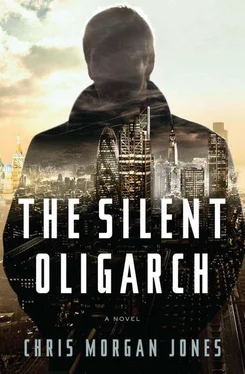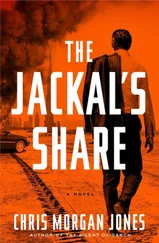“Good evening, Richard.” Malin did not look up. “Please, sit.”
Lock watched him read. Was this an evil man? Behind those blank eyes what was there? Blackness? A cold hatred? Efficiency, thought Lock. A single-minded commitment to an end. What end, he had never known.
Malin finished reading and put the document lightly to one side.
“How are you, Richard?”
“I’m fine, thank you. A little shaken. You know. But fine.”
“It was a great shock. He was young and it was not his time. It is never pleasant when this happens.” Malin paused and looked at Lock, who despite himself looked down at his lap. “I have heard no more since yesterday.”
“I haven’t found out a great deal, I’m afraid. He fell from the roof of the Hotel Gellért in Budapest, apparently. The police think it was suicide. I don’t know much more than that to be honest. I’m waiting for a call from Colonel Bashaev.”
Malin considered the information for a moment.
“If Dmitry had a failing,” he said at last, “it was that he was emotional about business. He was emotional about all things.”
Lock didn’t know what to say. This seemed unfair to Gerstman, who had always seemed, if anything, a zealous rationalist.
“Did you send flowers?” Malin asked.
“Yes,” said Lock. “To his office.”
“Good. Good. I was sorry to lose Dmitry. He was an effective worker. But in business it is important to keep one’s head, and he did not, I think. He did not.” Malin shook his head slightly, a gesture of considered regret. “This you must remember, Richard, especially now.”
Malin’s gaze seemed to deepen. Lock, lost in it for a moment, managed to respond only with a weak “Yes.”
“Do you understand?”
“I understand. You know I do.”
“I know you do.” Malin let Lock shift in his stare for a further second or two, then asked, “When is Paris?”
Paris. God, he had forgotten about Paris. A day or two of lying under oath. With an audience.
“It’s next week. I go to London tomorrow to have a final run-through with Kesler.”
“How is Mr. Kesler?”
“Good, I think.” He had spoken to Kesler three times in the previous week, each time to talk through some new materials that had to be absorbed before he gave testimony. In fact, Kesler, for the first time since Lock had known him, was beginning to sound exasperated; his last words had been that they had a great deal of work to do in London. Had he told Malin this directly? “He seems to think we can convince the tribunal that Tourna’s claim is vexatious. Let’s hope so.”
“But he is expecting that you will be questioned about the facts?”
“Almost certainly, yes.”
“And your position will be that I do not exist?”
“Our position—my position will be that I own Faringdon.”
Malin made a soft, low noise, something between a snort and a grunt.
“How did you come by it?”
“Faringdon? Well, you can trace the history back through the companies, all the way back to Arctec. My name is on everything. Ostensibly I own the lot anyway, always have done.”
Malin propped his elbows on his desk, clasped his hands together and rested his chin on them. He thought for a moment.
“This makes you a big man in Russia.”
“They can’t prove that I’m not.” Lock knew what he meant. Who would believe such a thing? “That’s the point.”
“All right. All right. Any more on Tourna?”
“Nothing interesting. I’m going to see the London guys this week. Bashaev is promising me good stuff for when I get back.”
“It would have been good to have something before Paris.”
Malin pinched the skin on his chin with his thumbs. Then he sat back and looked hard at Lock. “You have worked hard for this, Richard, for a long time, but in one moment so much can be undone. A whole life can be undone. For you and for me.”
Lock didn’t respond.
“I think that’s all now, Richard. Concentrate on Paris. Do not let Dmitry’s death distract you.”
Lock said that he would not, got up from his seat, agreed to see Malin in a fortnight and left. As he walked out of the office he could feel Malin’s eyes on his back and a chill ran across it. A life undone.
BASHAEV CALLED LOCK in his office the next morning. He confirmed what Lock already knew and added some new, jarring details. A post-mortem had revealed that Gerstman had had a blood alcohol level of 0.4 percent, enough to render him more or less senseless. At midnight, about two hours before he died, he had been seen in the Black Cat, a gay bar ten minutes from the Gellért. He had seemed crazed: according to one witness, “beside himself.” No one was with him. The police hadn’t been able to establish when he had left the club, or what he had done between there and the Gellért. He had e-mailed his wife a suicide note five minutes before he jumped. The police were now convinced that he had died as a result of suicide or misadventure and were not expecting to investigate further.
For Lock, who had spent a dark night dwelling on Malin’s words and convincing himself again that now more than ever he was indispensable, this news was disabling. Dmitry didn’t drink. He never had. Lock had never seen him drink so much as a single beer. He was famous for it throughout Malin’s team. Could he have been gay? He had never been at home in Moscow, that was true: whenever Lock had seen him there people had ribbed him about his running, about his sharp suits, about not drinking vodka. Lock imagined that others who had known Gerstman would nod their heads when they heard the news and congratulate themselves on knowing all along. But he and Nina had always seemed real. They were close, natural—Lock had seen it. Could you fake that?
In the end, thought Lock, I’m not subtle enough to think this through. What I do know is that in Russia there are few accidents. I’m wise enough to know that. And I can’t simply wait for one to happen to me.
THAT EVENING, before leaving for London and Paris, Lock took Oksana to dinner at Café Pushkin. On his way to meet her he thought about something Kesler had asked him: if you wanted to prove Malin was corrupt, where would you look? That, surely, was what the whole thing was about. If Malin had ordered Gerstman dead, it wasn’t because he objected to his drinking habits or his sexual preference. Gerstman must have known something. That much was clear.
What was less clear was how much Lock himself really knew; murkier still, what Malin thought he knew. Less than Gerstman, surely? Maybe not. Perhaps he knew all manner of things but didn’t understand their significance. If that was true, he risked meeting with an accident for no reason at all. After all these years being governed by others he had no desire to end his days so powerless. So he had a choice: he could show Malin that he was no threat, or he could become a threat after all.
His car sat in lanes of traffic on Tverskaya. He looked out of the window at the boxy Ladas and bulky ZiLs around him; even in his own BMW the petrol fumes were thick. What would a Russian do? A Russian never did anything for a single reason. That was one important principle. And he never revealed his true position. He was two-faced: he showed one to the world and the other he hid. Lock had never learned this trick. If his Russian colleagues had laughed at Gerstman’s softness they undoubtedly laughed still at Lock’s naïveté. But here, surely, was an easy opportunity to exploit that. If he could convince Malin that he was harmless while building up what he knew, that must be sensible. A dossier. That was what he needed. That’s what people in his position did, drew up a secret file, to be deployed when necessary—with luck, perhaps never. And after all, what else did he have, except what he knew?
Читать дальше












